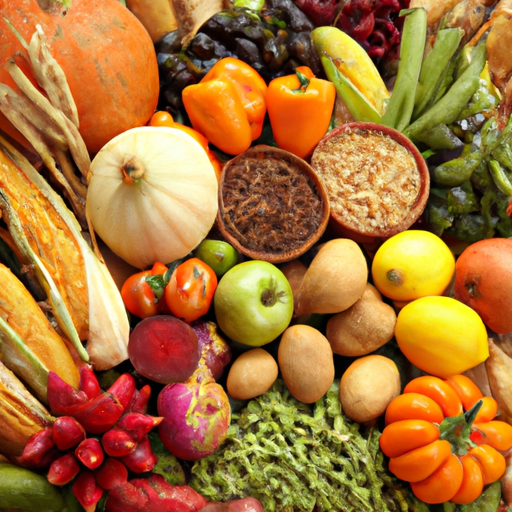You’ve probably heard the term “sustainable diet” being thrown around lately, but what is a sustainable diet? A sustainable diet refers to a way of eating that not only promotes good health but also takes into account the environmental impact of our food choices. It emphasizes consuming foods that are sourced and produced in a manner that supports ecological balance, conserves resources, and maintains biodiversity. In other words, it’s all about making choices that are good for both our bodies and the planet.
1. Definition of a Sustainable Diet
1.1. Introduction to Sustainable Diets
A sustainable diet can be defined as a way of eating that promotes both individual and planetary health. It takes into consideration the environmental, social, and economic impact of food production and consumption. By making conscious choices about the foods we eat, we can contribute to a more sustainable food system that supports our own well-being while also protecting the planet for future generations.
1.2. Key Principles of a Sustainable Diet
There are several key principles that underlie a sustainable diet:
- Plant-based focus: A sustainable diet places emphasis on consuming plant-based foods, such as fruits, vegetables, whole grains, legumes, nuts, and seeds. These foods are not only rich in nutrients but also have a lower environmental impact compared to animal-based products.
- Reduction of animal-based products: While plant-based foods take center stage, a sustainable diet also encourages the reduction of animal-based products, such as meat, dairy, and eggs. Livestock farming is a significant contributor to greenhouse gas emissions, deforestation, and water pollution, making the reduction of these products crucial for sustainability.
- Locally sourced and seasonal foods: Choosing locally sourced and seasonal foods reduces the carbon footprint associated with long-distance transportation. It also supports local farmers and helps preserve traditional agricultural practices.
- Minimization of food waste: A sustainable diet aims to minimize food waste by being mindful of portion sizes, properly storing leftovers, and using ingredients creatively. Food waste is not only a waste of precious resources but also a significant contributor to greenhouse gas emissions when it decomposes in landfills.
By following these principles, a sustainable diet can contribute to a healthier planet and a healthier you.
2. Environmental Impact of Food Production
2.1. Overview of Food Production’s Environmental Impact
Food production has a profound effect on the environment, impacting various ecosystems and natural resources. Some of the key environmental issues associated with food production include:
- Greenhouse gas emissions: The production, processing, and transportation of food contribute significantly to greenhouse gas emissions, particularly carbon dioxide, methane, and nitrous oxide. These emissions contribute to climate change and global warming.
- Land use and deforestation: Agriculture occupies a large portion of the Earth’s land, leading to deforestation and habitat destruction. Forests are often cleared to make way for crop cultivation or livestock grazing, resulting in the loss of biodiversity and disruption of ecosystems.
- Water consumption and pollution: Agriculture is a major consumer of freshwater resources, with irrigation accounting for a significant portion of water use. Excessive water extraction can lead to the depletion of water sources and exacerbate water scarcity. Additionally, the use of fertilizers and pesticides in agriculture can pollute water bodies, leading to eutrophication and harm to aquatic life.
2.2. Factors Influencing Environmental Impact
Several factors influence the environmental impact of food production:
- Food choices: The types of foods we consume significantly impact the environmental footprint of our diets. Plant-based foods generally have a lower environmental impact compared to animal-based products, as they require fewer resources and produce fewer greenhouse gas emissions.
- Production methods: Different agricultural practices have varying degrees of environmental impact. Conventional farming often relies on synthetic fertilizers and pesticides, which can have adverse effects on soil health and water quality. On the other hand, sustainable farming practices, such as organic farming and regenerative agriculture, prioritize soil health, biodiversity, and water conservation.
- Food transportation: The distance food travels from the point of production to the consumer’s plate also affects its environmental impact. Eating locally sourced and seasonal foods reduces the energy and emissions associated with long-distance transportation.
By being mindful of these factors and making conscious choices about our food, we can minimize the environmental impact of our diets and contribute to a more sustainable food system.

Check Out Our Top Eco Friendly Product Picks On Amazon Here
3. Health Benefits of a Sustainable Diet
3.1. Importance of a Balanced and Nutritious Diet
A sustainable diet emphasizes the importance of consuming a balanced and nutritious diet to support overall health and well-being. It advocates for the inclusion of a variety of plant-based foods that provide essential nutrients, vitamins, and minerals necessary for optimal health.
A balanced diet includes:
- Fruits and vegetables: These are rich sources of vitamins, minerals, and dietary fiber. They support immune function, contribute to healthy digestion, and reduce the risk of chronic diseases such as heart disease and certain types of cancer.
- Whole grains: Whole grains, such as brown rice, quinoa, and whole wheat bread, are high in fiber and provide a steady release of energy. They also contain important nutrients like B vitamins and trace minerals.
- Legumes: Legumes, including beans, lentils, and chickpeas, are excellent sources of plant-based protein, fiber, and micronutrients. They can help reduce the risk of heart disease, lower cholesterol levels, and support weight management.
- Nuts and seeds: Nuts and seeds are packed with healthy fats, protein, vitamins, and minerals. Including them in a sustainable diet can help reduce the risk of chronic diseases, such as heart disease and type 2 diabetes.
By prioritizing these food groups in a sustainable diet, individuals can enjoy the health benefits associated with a well-rounded and nutrient-dense eating pattern.
3.2. Critical Role of Sustainable Diets in Promoting Health
Sustainable diets not only benefit the environment but also play a critical role in promoting human health. By prioritizing plant-based foods and reducing the consumption of animal-based products, sustainable diets have been linked to numerous health benefits, including:
- Reduced risk of chronic diseases: Plant-based diets have been associated with a lower risk of developing chronic conditions, such as obesity, type 2 diabetes, hypertension, and certain types of cancer. The high fiber content and phytonutrients found in plant-based foods contribute to these positive health outcomes.
- Heart health: Sustainable diets that are rich in fruits, vegetables, whole grains, legumes, and healthy fats have been shown to support heart health by reducing the risk factors for cardiovascular diseases, such as high blood pressure and high cholesterol levels.
- Weight management: Sustainable diets can be beneficial for weight management and maintaining a healthy body weight. Plant-based foods are generally lower in calories and higher in fiber, which promotes satiety and reduces the risk of overeating.
- Improved digestion: The fiber content in plant-based foods supports healthy digestion and helps prevent constipation. Additionally, the consumption of fermented foods, such as yogurt and sauerkraut, which are often included in sustainable diets, can promote a healthy gut microbiome.
By adopting a sustainable diet, you can not only contribute to a healthier planet but also enhance your own well-being through improved health outcomes.
4. What Is A Sustainable Diet: Components
4.1. Consumption of Plant-Based Foods
The consumption of plant-based foods forms the foundation of a sustainable diet. Plant-based foods include fruits, vegetables, whole grains, legumes, nuts, and seeds. These foods are not only rich in essential nutrients but also have a lower environmental impact compared to animal-based products.
Including a variety of plant-based foods in your diet ensures that you receive a wide range of essential vitamins, minerals, and antioxidants. They are also excellent sources of dietary fiber, which promotes digestive health and helps maintain a healthy weight.
To incorporate more plant-based foods into your diet, consider the following tips:
- Aim to fill half of your plate with fruits and vegetables at each meal.
- Experiment with different types of whole grains, such as quinoa, brown rice, and whole wheat pasta, to diversify your carbohydrate sources.
- Replace meat with plant-based protein sources, such as beans, lentils, tofu, tempeh, or seitan, in your favorite recipes.
- Snack on nuts and seeds for a nutrient-packed and satisfying crunch.
- Include a variety of herbs and spices in your cooking to add flavor and depth to plant-based dishes.
By making plant-based foods the focus of your meals, you can enjoy a wide array of flavors and nutritional benefits while reducing your environmental impact.
4.2. Reduction of Animal-Based Products
While plant-based foods take center stage in a sustainable diet, it is also important to reduce the consumption of animal-based products. Livestock farming has a significant impact on the environment, contributing to greenhouse gas emissions, deforestation, and water pollution.
Reducing animal-based products in your diet can be beneficial for both your health and the environment. Here are some strategies to help you accomplish this:
- Choose smaller portions of animal-based proteins, such as meat, poultry, fish, and dairy products.
- Replace animal protein with plant-based alternatives, such as tofu, tempeh, seitan, or plant-based meat substitutes.
- Increase your intake of plant-based protein sources, such as beans, lentils, and chickpeas.
- Opt for plant-based milk alternatives, such as almond milk, soy milk, or oat milk, instead of dairy milk.
- Explore different cooking methods and flavors to make plant-based meals exciting and enjoyable.
By gradually reducing your consumption of animal-based products and exploring alternative protein sources, you can contribute to a more sustainable food system while still maintaining a balanced and nutritious diet.
4.3. Locally Sourced and Seasonal Foods
Choosing locally sourced and seasonal foods is another important component of a sustainable diet. When you choose to eat foods that are produced locally, you not only support local farmers and communities but also reduce the carbon footprint associated with long-distance transportation.
Here are some reasons why you should consider incorporating locally sourced and seasonal foods into your diet:
- Freshness and taste: Locally sourced foods are often harvested at their peak ripeness, ensuring maximum flavor and nutritional content. They are likely to be fresher and haven’t traveled long distances, which can result in better taste and texture.
- Environmental impact: By purchasing locally sourced foods, you contribute to a lower carbon footprint. The energy and emissions associated with long-distance transportation are significantly reduced when you choose foods that are grown or produced nearby.
- Community support: Buying from local farmers and food producers helps support your local community. It allows them to thrive economically and continue practicing sustainable and ethical farming methods.
- Seasonal variety: Eating with the seasons allows you to enjoy a diverse range of fruits and vegetables throughout the year. Seasonal produce is often more affordable, abundant, and nutritionally rich.
To incorporate locally sourced and seasonal foods into your diet, consider visiting farmers markets, joining a Community Supported Agriculture (CSA) program, or growing your own food in a backyard garden or balcony pots. These practices not only help you connect with your local food system but also provide an opportunity to savor the flavors of each season.
4.4. Minimization of Food Waste
Minimizing food waste is a crucial aspect of a sustainable diet. Food waste not only represents a waste of valuable resources but also contributes to greenhouse gas emissions when it decomposes in landfills.
Here are some strategies to help you minimize food waste and make the most of your meals:
- Plan meals and create a shopping list: Take some time to plan your meals for the week and create a shopping list based on your planned recipes. This ensures that you only buy what you need and reduces the chances of food going to waste.
- Proper food storage: Practice proper food storage techniques, such as correctly sealing leftovers and storing food at appropriate temperatures. This helps extend the shelf life of perishable items, reducing the likelihood of spoilage.
- Portion control: Be mindful of portion sizes and serve yourself and your family in appropriate amounts. Adjusting portion sizes can help prevent overeating and reduce the amount of leftover food.
- Get creative with leftovers: Repurpose leftovers into new dishes or use them as ingredients in soups, stews, or salads. Finding creative ways to use leftovers can help minimize waste and introduce variety into your meals.
- Composting: If you have food scraps that cannot be consumed, consider starting a compost pile or using a composting service. Composting helps divert organic waste from landfills and creates nutrient-rich soil for gardening.
By adopting these practices, you can minimize food waste at home and contribute to a more sustainable food system.

5. What Is A Sustainable Diet: Economic Implications
5.1. Potential Economic Benefits
Adopting sustainable diets can offer significant economic benefits for individuals, communities, and nations. These economic benefits include:
- Reduced healthcare costs: Sustainable diets, which emphasize the consumption of nutrient-dense plant-based foods, can help prevent chronic diseases. This has the potential to reduce healthcare costs associated with managing these diseases, benefiting individuals and healthcare systems.
- Support for local economies: Choosing locally sourced and seasonal foods supports local farmers and food producers, contributing to the growth and sustainability of local economies. This can create jobs, stimulate local businesses, and improve food security.
- Conservation of resources: By reducing food waste and making conscious choices about food consumption, individuals can save money on their grocery bills. Additionally, sustainable agricultural practices, such as organic farming, can reduce the reliance on expensive synthetic inputs, benefiting farmers economically.
- Innovation and job creation: The transition to a more sustainable food system requires innovation and adaptation. This presents opportunities for job creation and entrepreneurship in areas such as sustainable agriculture, plant-based product development, and alternative protein production.
5.2. Challenges in Implementing Sustainable Diets
While there are potential economic benefits to adopting sustainable diets, there are also challenges that need to be addressed:
- Affordability: For some individuals and communities, the upfront cost of switching to a sustainable diet can be a barrier. Fresh produce, organic products, and alternative protein sources may be more expensive compared to conventional and animal-based counterparts. However, over the long term, the potential healthcare cost savings and environmental benefits may outweigh the initial investment.
- Infrastructure and logistics: Transitioning to a more sustainable food system requires the development of infrastructure and logistics to support local food production, distribution, and access. Investments in these areas may be necessary to overcome the challenges of scaling up sustainable food practices.
- Agricultural subsidies: Government subsidies often favor conventional agricultural practices and large-scale production, making it challenging for sustainable farmers to compete economically. Shifting support from conventional farming to sustainable practices can help level the playing field and encourage more sustainable agricultural methods.
By addressing these challenges and implementing supportive policies and initiatives, the economic benefits of sustainable diets can be realized at all levels.
6. What Is A Sustainable Diet: Social Aspects
6.1. Importance of Food Justice and Accessibility
The social aspects of sustainable diets encompass food justice, equity, and accessibility. It is essential to ensure that everyone has access to safe, nutritious, and culturally appropriate food, regardless of their socioeconomic status or geographic location.
- Food justice: Sustainable diets strive to uphold principles of food justice, which advocate for fairness and equality in the food system. This includes addressing and challenging systemic issues such as food deserts, food insecurity, and food sovereignty.
- Food insecurity: Sustainable diets are committed to addressing food insecurity, which affects millions of individuals and families worldwide. By promoting local food production, supporting community gardens, and improving access to affordable, nutritious food, sustainable diets can help alleviate food insecurity and promote social well-being.
- Cultural diversity: Sustainable diets recognize the importance of cultural diversity and embrace the role of cultural heritage in food choices. It is essential to respect and celebrate diverse culinary traditions and encourage the integration of traditional foods into sustainable eating patterns.
Ensuring food justice and accessibility is not only a matter of social responsibility but also contributes to the overall sustainability and well-being of communities.
6.2. Cultural Considerations in Sustainable Diets
Cultural considerations play a significant role in the adoption and acceptance of sustainable diets. Cultural traditions, food preferences, and culinary practices vary across different communities and regions. Therefore, it is essential to integrate cultural perspectives into discussions surrounding sustainable diets.
- Cultural preservation: Sustainable diets can incorporate traditional foods and culinary practices that have been passed down through generations. By preserving and celebrating cultural traditions, sustainable diets can be more inclusive and respectful of diverse cultural heritages.
- Education and awareness: Education and awareness campaigns about the environmental and health benefits of sustainable diets should be culturally sensitive and tailored to the specific needs and beliefs of different communities. By taking cultural considerations into account, sustainable diets can be more relatable and accessible to a wider audience.
- Collaborative approaches: Engaging with local communities, cultural leaders, and community organizations is crucial for the successful implementation of sustainable diets. Collaborative approaches encourage ownership and ensure that sustainable eating patterns align with cultural values and preferences.
By acknowledging cultural considerations and embracing the diversity of food cultures, sustainable diets can be more inclusive, effective, and adaptable in different cultural contexts.

7. What Is A Sustainable Diet: Policy and Advocacy
7.1. Government Initiatives and Regulations
Government initiatives and regulations play a vital role in promoting and supporting sustainable diets. Here are some key policy areas that can help drive the adoption of sustainable diets:
- Agricultural policies: Governments can incentivize sustainable agricultural practices and support the transition to organic farming, regenerative agriculture, and agroecology. This can include providing financial support, technical assistance, and training to farmers.
- Food labeling and transparency: Governments can enforce clear and accurate food labeling practices to help consumers make informed choices about the environmental and health impacts of their food. Labels can indicate whether a product is organic, locally sourced, or sustainably produced.
- School food programs: Governments can focus on providing healthy, sustainable meals in school food programs. By partnering with local farmers and using locally sourced ingredients, these programs can promote sustainable diets while supporting local economies.
7.2. Role of Non-Governmental Organizations (NGOs)
Non-Governmental Organizations (NGOs) play a crucial role in advocating for sustainable diets and driving positive change within the food system. These organizations often work on a grassroots level, engaging with communities and individuals to promote sustainable eating practices. Some key roles of NGOs include:
- Education and outreach: NGOs can provide educational resources, workshops, and community initiatives to raise awareness about sustainable diets. They play a crucial role in disseminating information and empowering individuals to make sustainable choices.
- Policy advocacy: NGOs can advocate for policies and initiatives that support sustainable diets, such as better agricultural practices, food labeling regulations, and increased access to nutritious, affordable foods. They can also work alongside governments to shape policy frameworks that promote sustainability.
- Collaboration and partnerships: NGOs can collaborate with various stakeholders, including government agencies, businesses, and community organizations, to drive collective action towards sustainable diets. Building strong partnerships helps amplify the impact of their work and fosters a more integrated and holistic approach to sustainability.
7.3. Individual Actions and Consumer Choices
As an individual, you also have a significant role to play in promoting sustainable diets through your consumer choices and everyday actions. Here are some ways you can contribute:
- Choose sustainable and ethically produced foods: Be conscious of the environmental and ethical implications of the foods you purchase. Consider factors such as organic certification, fair trade labels, and the environmental impact of production.
- Reduce food waste: Minimize food waste by planning meals, properly storing leftovers, and using ingredients creatively. By reducing your personal food waste, you contribute to a more sustainable food system.
- Support local and sustainable farmers: Seek out local farmers’ markets, participate in Community Supported Agriculture (CSA) programs, and choose products that support sustainable farming practices. By doing so, you contribute to the economic viability of local farmers and help promote sustainable agriculture.
- Share knowledge and encourage others: Educate your friends, family, and community about the benefits and importance of sustainable diets. Engage in conversations about sustainable food choices and share resources to inspire others to make positive changes.
By making conscious choices and sharing your knowledge, you can create a ripple effect that inspires others to adopt sustainable diets and contribute to a more sustainable food system.
8. What Is A Sustainable Diet: Challenges and Barriers
8.1. Cultural and Social Resistance
Adopting a sustainable diet can sometimes be met with cultural and social resistance. Food choices and eating habits can be deeply ingrained in cultural traditions and personal identities. Some challenges and barriers that individuals may face include:
- Cultural traditions and expectations: Traditional food cultures often center around animal-based products or certain foods that are considered essential for cultural celebrations or social gatherings. Shifting away from these traditions can be challenging due to social pressures and a fear of judgment or exclusion.
- Personal preferences and taste preferences: Personal preferences play a significant role in shaping food choices. Many people have a lifelong attachment to certain foods, flavors, and textures that are not aligned with sustainable diets. Overcoming these personal preferences can be challenging.
- Lack of awareness and understanding: Some individuals may not be aware of the environmental and health implications of their food choices or may not fully understand the concept of sustainable diets. Education and awareness campaigns are essential to address this barrier.
- Food affordability: Sustainable and organic food options can sometimes be more expensive than conventional alternatives, making them less accessible to individuals with lower incomes. The perception that sustainable diets are only for the privileged can create barriers to adoption.
To overcome these barriers, it is important to approach sustainable diets with empathy, respect for cultural diversity, and a nuanced understanding of individual circumstances. Engaging in open and non-judgmental conversations about sustainable diets can help foster understanding and inspire positive change.
8.2. Lack of Awareness and Education
Lack of awareness and education about sustainable diets can hinder individuals from making informed choices. Some people may not be aware of the environmental impact of their food choices or the potential health benefits associated with sustainable diets. Key challenges include:
- Limited access to information: Information about sustainable diets, their benefits, and how to adopt them may not be readily available or easily accessible to everyone. This can hinder individuals’ ability to make informed decisions about their food choices.
- Misinformation and conflicting messages: The abundance of information available about diets and nutrition can be overwhelming, and conflicting messages can lead to confusion and skepticism. It is essential to rely on trusted sources of information and research-backed evidence when understanding sustainable diets.
- Education gaps: Sustainable diets may not be adequately addressed in formal education systems or public health initiatives. This can result in a lack of knowledge and understanding among individuals, limiting their ability to make sustainable food choices.
Addressing these challenges requires comprehensive education and awareness campaigns that target diverse populations. Providing accessible and evidence-based information about sustainable diets can empower individuals to make informed choices and participate in the transition to a more sustainable food system.
8.3. Affordability and Accessibility Issues
Affordability and accessibility are significant challenges that individuals may face when adopting a sustainable diet. Sustainable and organic food options can sometimes be more expensive or less available, particularly in low-income communities or areas with limited access to fresh produce. Key challenges include:
- Higher costs of sustainable products: Organic and sustainably produced foods can be more expensive due to higher production costs and limited economies of scale. This can make it challenging for individuals with lower incomes to afford sustainable options.
- Food deserts and limited access to fresh produce: Many communities, particularly in urban areas, lack access to affordable and nutritious food options. These food deserts often result in a reliance on processed and unhealthy foods, limiting the ability to adopt sustainable diets.
- Limited availability of sustainable options: In some regions, sustainable and locally sourced products may be less accessible due to limited availability or logistical challenges. This can limit individuals’ ability to prioritize sustainable options.
Addressing affordability and accessibility issues requires comprehensive strategies that tackle systemic issues within the food system. This includes initiatives to promote local food production, increase the availability of affordable fresh produce, and support communities disproportionately affected by food insecurity and limited food access.

9. What Is A Sustainable Diet: Success Stories
9.1. Case Studies of Successful Implementation
There have been numerous success stories and case studies that highlight the successful implementation of sustainable diets in various settings. Here are a few examples:
- The Nordic Diet: The Nordic countries have embraced the Nordic Diet, which emphasizes locally sourced, seasonal, and traditional foods. This approach has not only improved public health outcomes but also benefited local farmers and reduced the environmental impact of food production in the region.
- The Blue Zones: The Blue Zones are regions around the world where individuals have the highest life expectancy and lower rates of chronic diseases. These regions, including Okinawa (Japan), Ikaria (Greece), and Nicoya (Costa Rica), have diets that are predominantly plant-based, consisting of whole foods, beans, legumes, and minimal processed foods.
- The Planetary Health Diet: The Planetary Health Diet, developed by the EAT-Lancet Commission, provides a framework for a healthy and sustainable diet. This diet emphasizes a significant shift towards plant-based foods while limiting the consumption of animal-based products. It has been widely endorsed as a sustainable dietary pattern.
These case studies demonstrate that sustainable diets can be successfully implemented and can have positive impacts on individual health, environmental sustainability, and local economies.
9.2. Cultural and Regional Sustainable Diets
Cultural and regional sustainable diets demonstrate the diverse ways in which sustainability can be achieved while honoring cultural traditions and heritage. Some examples include:
- Mediterranean Diet: The Mediterranean Diet, characterized by high consumption of fruits, vegetables, whole grains, legumes, olive oil, fish, and moderate consumption of dairy and red wine, is not only associated with numerous health benefits but also reflects the cultural and culinary traditions of Mediterranean countries.
- Indian Vegetarian Diets: Vegetarianism holds significant cultural and religious importance in India. Indian vegetarian diets are rich in plant-based proteins, such as lentils, chickpeas, and tofu, and feature a wide variety of spices and flavors.
- Indigenous Diets: Indigenous communities often have deep connections to the land and practice sustainable food systems that honor traditional knowledge and biodiversity. These diets prioritize seasonal and foraged foods, such as native fruits, vegetables, and wild game.
These examples demonstrate the importance of cultural diversity and the potential for sustainable diets to embrace and celebrate different culinary traditions and cultural experiences.
10. What Is A Sustainable Diet: Future Outlook
10.1. Importance of Sustainable Diets for the Future
As the world grapples with the challenges of climate change, food insecurity, and public health crises, the importance of sustainable diets has never been more evident. Sustainable diets offer a promising solution to address these issues simultaneously, providing an opportunity to create a healthier and more sustainable future for all.
By adopting sustainable diets, we can:
- Mitigate climate change: The food system is a significant contributor to greenhouse gas emissions. Shifting towards sustainable diets that prioritize plant-based foods and reduce the consumption of animal-based products can significantly reduce these emissions and contribute to global efforts to combat climate change.
- Improve public health: Sustainable diets, which emphasize nutrient-dense plant-based foods, have been linked to numerous health benefits, including a reduced risk of chronic diseases. By adopting sustainable diets, we can promote individual health and alleviate the burden on healthcare systems.
- Protect biodiversity and ecosystems: The adoption of sustainable diets helps protect biodiversity and preserve ecosystems. By reducing deforestation, water pollution, and land degradation associated with food production, we can conserve natural resources and preserve essential habitats.
10.2. Call to Action and Summing Up
Embracing a sustainable diet is not only a choice in the best interest of our own health but also a responsibility we owe to future generations and the planet as a whole. As individuals, communities, and societies, we have the power to make a difference through our food choices and everyday actions.
By following the key principles of a sustainable diet, including a focus on plant-based foods, reduction of animal-based products, support for local and seasonal options, and minimizing food waste, we can contribute to a more sustainable food system.
Policy makers, NGOs, and individuals must work collaboratively to address the challenges and barriers to adopting sustainable diets. This includes implementing supportive policies and initiatives, providing education and awareness campaigns, and ensuring affordability and accessibility of sustainable food options for all.
By recognizing the interconnections between food, the environment, and human health, we can pave the way for a future where sustainable diets are the norm rather than the exception. Together, we can build a healthier, more equitable, and sustainable food system for everyone.




